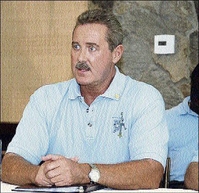Stanford's reputation takes a nose dive
Published: Sunday | February 22, 2009

Sir Allen Stanford ... charged by United States regulators over an alleged multibillion-dollar fraud. - File
HE MAY have pumped millions of dollars into Antigua and Barbuda's economy, but Sir Allen Stanford's presence has always disturbed hardliners in that Caribbean country.
There was a dramatic run on Stanford's banks in Antigua on Wednesday when it was announced the previous day that the Securities and Exchange Commission (SEC) in the United States had charged the American financier with defrauding investors US$8 billion.
Stanford was served with legal papers by the Federal Bureau of Investigation in Virginia on Thursday.
Antiguan journalist Colin James says Stanford's benevolence has earned him many admirers in the country, but points out that there have been sceptics since the Texan set up shop there almost 20 years ago.
a lot of heat
"He got a lot of heat from (the late journalist and politician) Tim Hector, who criticised the way he went about things. At one time, Hector accused him of decolonising Antigua and behaving as its colonial master," James told The Sunday Gleaner.
Stanford moved to Antigua and Barbuda in the late 1980s, reportedly after a fallout with authorities in the British-dependent Montseratt. He quickly developed a relationship with the government of prime minister Lester Bird and started a string of successful ventures.
The Bank of Antigua, Stanford International Bank and the Stanford Development Company cover the corporate side of Stanford's businesses in Antigua. He also owns the Sticky Wicket and Pavillion restaurants in St John's, the Antiguan capital.
In the last three years, Stanford got into cricket promotion by investing millions into Twenty20 tournaments held at his stadium in St John's.
a disputed knighthood
James estimates Stanford's businesses employ almost 1,000 persons. His investment in Antigua and Barbuda earned him a disputed knighthood from the government in 2006.
He said many Antiguans, especially Stanford's employees, have been on edge since he was charged.
"The mood is one of uncertainty; people just don't know what's going to happen. I spoke to workers at his companies and they say they are concerned about their future," James said.
Investors from the Caribbean and Latin America descended on the Stanford International Bank in St John's this week, anxious to hear what will become of their money. With his fate now in the hands of American authorities, James believes Stanford's reputation in Antigua and Barbuda may have suffered irreparable damage.
"Some are saying he should be given the benefit of the doubt, until he's proven guilty, but, as it stands now, it's (reputation) going to take a hit, definitely," James said.








